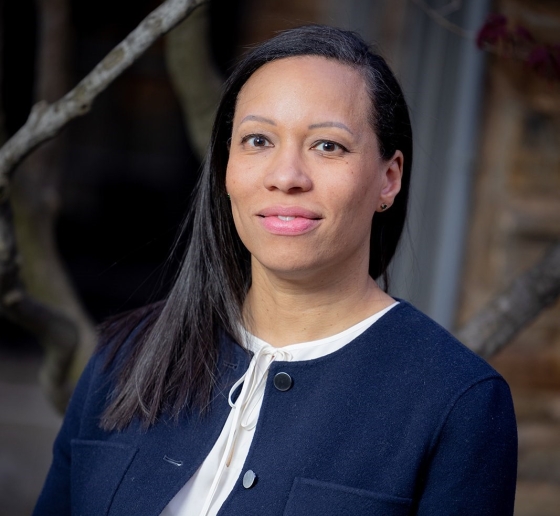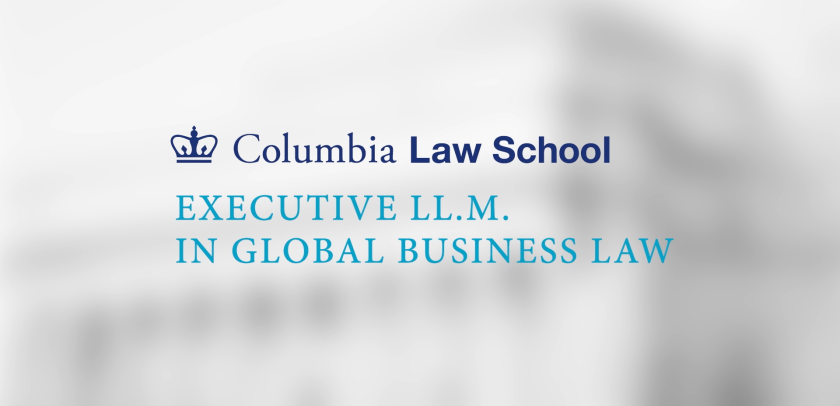Kristina Milbourn ’22 E.LL.M.: Finding the Meaning of a Columbia Law Degree
A lawyer in Canada, Kristina Milbourn ’22 E.LL.M. wanted to grow her experience, knowledge, and network without taking a year off from work. Columbia Law School’s hybrid, six-month Executive LL.M. program was the answer.

Hometown: Toronto, Canada
Education: B.Sc. in Biology, Psychology, and Chemistry (Honours) from the University of Toronto; Bachelor of Laws from Western University
Before Columbia Law: Director of Copyright and Broadband at Rogers Communications
After Columbia Law: Head of Litigation at Rogers Communications
Why did you decide to pursue an E.LL.M. degree at Columbia Law School?
After a few years of working with the regulatory team at Rogers Communications, I got to a place where I was very comfortable with my accountabilities, but I was also wondering how I could continue to grow as a professional. Then the COVID-19 pandemic happened, and it provided a lot of time for contemplation and reflection. As much as I was happy in my role, I started to seriously think about pursuing a Master of Laws degree at an American or foreign university. As I was researching Columbia’s E.LL.M., I became quite impressed. I never imagined being able to earn my LL.M. in an accelerated way. The E.LL.M. allowed me to achieve my objective while continuing to contribute in the workplace.
What else appealed to you about the curriculum?
The fact that the program focuses on Global Business Law was an opportunity to expand my knowledge and take on topics that I might not have otherwise approached—corporate law, venture capitalism, and emerging technologies—which was incrementally more valuable than a degree in topics with which I had previous experience.
In the E.LL.M. program, you spend the first few months online, the summer on campus, and the last portion online. Tell us about the benefits of the hybrid nature of the program.
After spending the first year of COVID attending meetings, conferences, and speaking on panels online, I felt prepared for a hybrid learning environment. The hybrid nature of the E.LL.M. program also makes tremendous sense because it is the only way to earn this degree within the six-month timeframe and continue working. However, the summer on-campus session was the absolute highlight of the program for me.
What is your biggest takeaway from the Executive LL.M. program?
The power of Columbia Law’s network of students, faculty, and alumni. I was grouped with 24 other students from around the globe who were already doing amazing things with their careers. We could recognize ourselves in one another because we all had the same gumption to enter this program, so we felt like kindred spirits. I found myself recognizing those moments of “This is a very, very powerful network,” not just globally but throughout history—I can’t believe that notionally I now have something in common with Justice Ruth Bader Ginsburg ’59.
Did you have a quintessential New York moment during your time here?
There is something very special about New York’s energy. Toward the end of my time in New York, I decided to walk across the Brooklyn Bridge. That was a moment for me where I was having all these feelings of, “Wow, Kristina. You did this.” I was at the end of the program, and I had a real sense of accomplishment. That was a very special personal moment for me.
Do you have any advice for incoming students?
Stick with it because it does feel challenging. I tried to plan out every day. Work your process. Stay focused, and stay in the moment, and keep showing up even when you feel overwhelmed. This is possible, and it will lead to great things, but it does require consistent discipline.
How do you make time for yourself?
Canada has great outdoor spas. After I got home from the program, I spent some time at a mountain spa to decompress. I like to do things that promote good mental health—so jogging, spending time outside, and trying to be as unscheduled during my downtime as possible.
What do you hope to do next, now that you’ve graduated?
I think the benefit, or maybe the responsibility, of earning a law degree at Columbia requires you to think beyond what you’re currently doing and dream a little bit bigger and think of meaningful ways to help the community. I’m excited to work on my current portfolio, but I’m also thinking of ways to be impactful in my community and how to be a good leader, especially as a woman of color. I ask myself, “What was this degree for?” It can’t be just for me. I think the best application of an opportunity like this is to put yourself in the corridors of power and rooms where you can influence outcomes. How can I put myself in those positions to make sure those decisions are democratic and not viewed with bias and result in fair outcomes?
